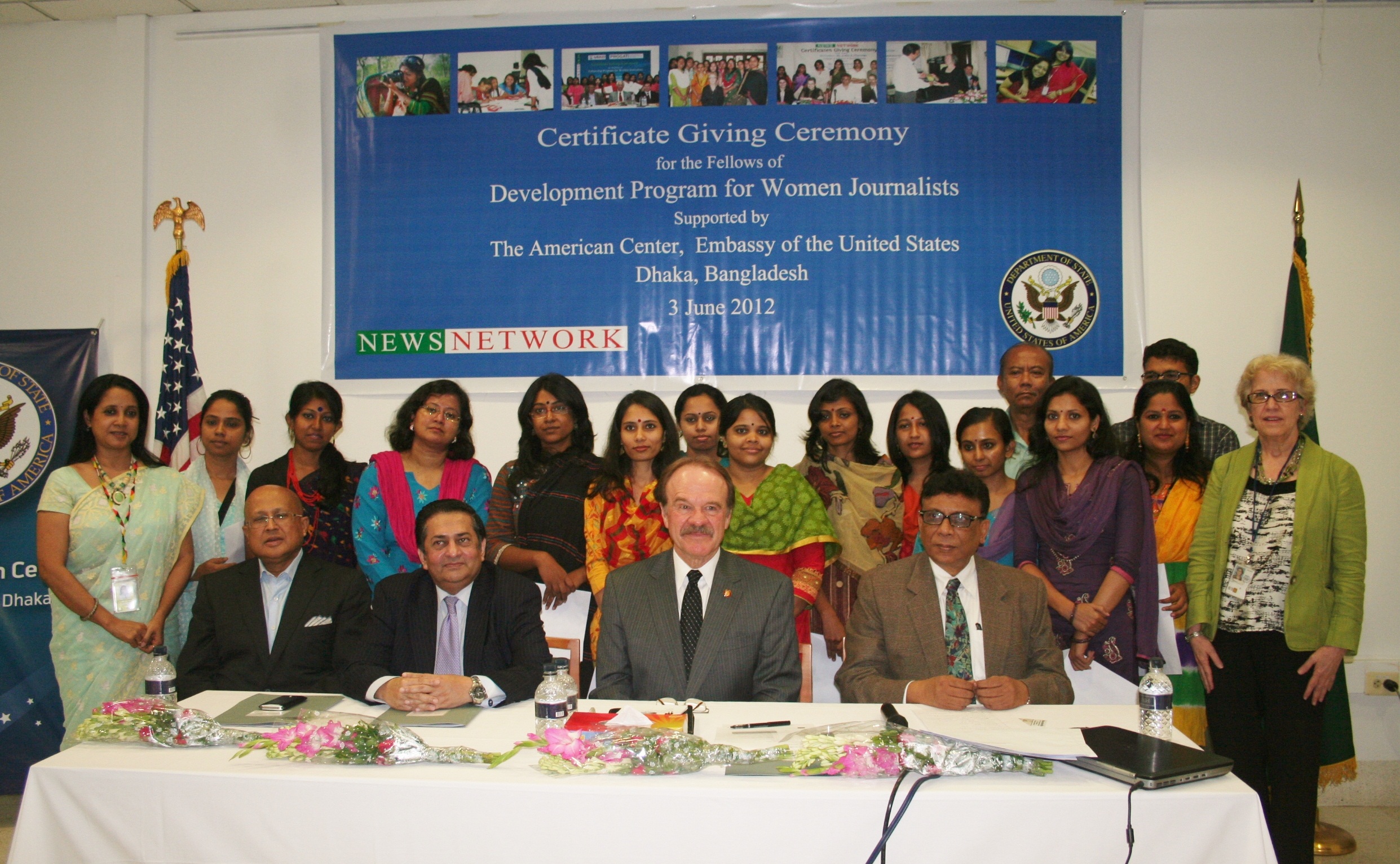
Bangladesh needs more female journalists to promote gender equality in media
News Networ k has been running a fellowship programme for over a decade to encourage young women to take up journalism as a profession and increase their number in media. It is one of the most successful and trend setting programme of News Network. Many of those fellows are now well placed in both print and electronic news media. The programme has been able to attract international organisations, donors and some foreign missions in Bangladesh. They were supported News Network to carry out the programme. But in recent fund crises the organisation fail to run the fellowship. As many as 300 women have been trained under this programme till 2015. About 60 percent of them are already working in the mainstream journalism.
k has been running a fellowship programme for over a decade to encourage young women to take up journalism as a profession and increase their number in media. It is one of the most successful and trend setting programme of News Network. Many of those fellows are now well placed in both print and electronic news media. The programme has been able to attract international organisations, donors and some foreign missions in Bangladesh. They were supported News Network to carry out the programme. But in recent fund crises the organisation fail to run the fellowship. As many as 300 women have been trained under this programme till 2015. About 60 percent of them are already working in the mainstream journalism.

But we have to go far away for achieving gender equality. Women journalists are about 6 percent among the total number of country’s journalists.
News Network further inspired after participating in First International Conference and General Assembly were held at ‘Palais des Nation’, Geneva in last year 6 to 10 December 2015.
News Network is dedicated and committed to continue the initiatives to achieve gender equality in media. So we look support from national and international organizations.
You can reach to me by email.
Shahiduzzaman, Editor and CEO, News Network
www.newsnetwork-bd.org

The United Nations Democracy Fund highlights News Network’s activities
The United ![]() Nations Democracy Fund (UNDEF) highlights News Network activities in its recent published newsletter. News Network with the support from UNDEF is implementing a project, ‘Rural Media Development for Promoting Democracy and Human Rights in Bangladesh’. It aims to strengthen democracy and human rights in social life through media development in rural areas by developing the professional skills of rural journalists, editors and CSO staff to defend and promote democracy and human rights issues. Click UNDEF newsletter for details.
Nations Democracy Fund (UNDEF) highlights News Network activities in its recent published newsletter. News Network with the support from UNDEF is implementing a project, ‘Rural Media Development for Promoting Democracy and Human Rights in Bangladesh’. It aims to strengthen democracy and human rights in social life through media development in rural areas by developing the professional skills of rural journalists, editors and CSO staff to defend and promote democracy and human rights issues. Click UNDEF newsletter for details.

Global Campaign for Mercury-Free Dentistry
Charles G. Bro wn, President of World Alliance for Mercury-Free Dentistry. He is a former Attorney General of the state of West Virginia. As part of his global campaign on mercury free-dentistry Mr. Brown visited Bangladesh from 6 -7 June. News Network is one of the Bangladesh organisations supporting the campaign in Bangladesh
wn, President of World Alliance for Mercury-Free Dentistry. He is a former Attorney General of the state of West Virginia. As part of his global campaign on mercury free-dentistry Mr. Brown visited Bangladesh from 6 -7 June. News Network is one of the Bangladesh organisations supporting the campaign in Bangladesh
Following the Minamata Convention on Mercury, signed in 2013 the organisation has launched global campaign to ratify the convention to all the countries for reducing or eliminating all man-made uses of mercury. -News Network
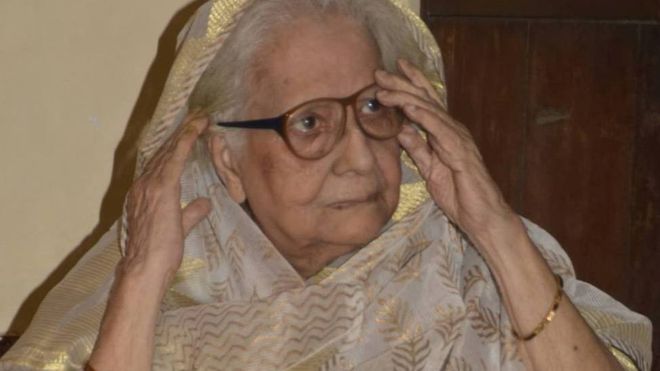
Bangladesh’s First Female Journalist, Nurjahan Begum No More
Nurjahan Begum, the first female journalist in Bangladesh and a trailblazer for female journalists in South Asia, has died on 23 May 2016. She was the editor of Begum magazine, the first magazine for women in the subcontinent, for the last 65 years. Ms Begum was dedicated to the magazine – editing it up until her death at 91.
Begum was Bangladesh’s first weekly magazine with pictures, and created opportunities for many female Muslim writers. The magazine was founded in 1947 by Ms Begum’s father, Nasir Uddin, who was also a journalist. It was first published from what was then Calcutta (now Kolkata) a month before India gained freedom from British rule, and shifted to Dhaka in 1950.

The magazine was hugely popular with Muslim women readers but also attracted the attention of men. It was even distributed to rural areas through the post.
There were few voices for women in 1947, and at that time women in our society didn’t dare to take their own photos. Begum brought major changes towards that attitude.
Ms Begum will be remembered for relentlessly pursuing women’s rights and focusing on their successes in every publication of Begum.
Bangladesh President Abdul Hamid and Prime Minister Sheikh Hasina expressed profound shock at her death. In separate messages, they conveyed deep sympathy to the bereaved family members and prayed for eternal peace of the departed soul. BBC
Photos: SALMA AHMED
Development Opportunities for Journalists
Uncovering Security: Emerging Threats
The Tho mson Reuters Foundation, in partnership with the Stanley Foundation and Gerda Henkel Stiftung, is launching a new programme which will support journalists to uncover emerging threats in specific communities, countries or regions worldwide, and bring these stories to a wide audience.
mson Reuters Foundation, in partnership with the Stanley Foundation and Gerda Henkel Stiftung, is launching a new programme which will support journalists to uncover emerging threats in specific communities, countries or regions worldwide, and bring these stories to a wide audience.
Uncovering Security: Emerging Threats provides a unique opportunity for collaboration. Participating journalists may choose to work in pairs or small teams and work on the same story together. They may also form partnerships with researchers who take part in the seminar – many of whom have experience gathering information ‘on the ground’ – to discover new leads, incorporate another story angle, or to deepen the content they produce.
Journalists must submit an online application before 12 July 2016 deadline.
The application requires journalists to submit a brief story idea. All story ideas must relate to an emerging security situation in a specific community, country or region in the world.
IWMF support to women journalists from around the world
Application open for June 1 – July 6, 2016
![]() An applicant must be a woman journalist. If applicable, teams of journalists may apply, but the team leader must be a woman journalist and the group must include at least 50 percent women. About the Fund, The IWMF’s Howard G. Buffett Fund for Women Journalists is an incredible resource for talented reporters and will make a real difference in the field of journalism. Beginning in 2015 and continuing for the next ten years, the IWMF will make an annual total of $230,000 worth of grants to support women journalists in their projects and endeavors. The fund is not limited in either the grant dollar amount or the number of grants awarded within the annual total. The fund was designed to help women journalists from around the world by providing grantees support to
An applicant must be a woman journalist. If applicable, teams of journalists may apply, but the team leader must be a woman journalist and the group must include at least 50 percent women. About the Fund, The IWMF’s Howard G. Buffett Fund for Women Journalists is an incredible resource for talented reporters and will make a real difference in the field of journalism. Beginning in 2015 and continuing for the next ten years, the IWMF will make an annual total of $230,000 worth of grants to support women journalists in their projects and endeavors. The fund is not limited in either the grant dollar amount or the number of grants awarded within the annual total. The fund was designed to help women journalists from around the world by providing grantees support to
- Expose under-reported but critical global issues
- Undertake ambitious projects that challenge traditional media narratives
- Develop field-based expertise and strengthen careers
- Pursue critical skills training and leadership opportunities
- Launch entrepreneurial news projects or acquire the skill to do so
2016 U.N. CORRESPONDENTS ASSOCIATION AWARDS FOR BEST MEDIA COVERAGE OF THE UNITED NATIONS AND U.N. AGENCIES

The United Nations Correspondents Association (UNCA) invites media worldwide to submit entries for its 21st annual UNCA Awards for the best print, broadcast (TV & Radio) and online, web-based media coverage of the United Nations, U.N. agencies and field operations. The prizes amount to over $60,000 to be distributed among the prize categories and winners. The UNCA awards are open to all journalists anywhere in the world. Deadline for submissions is: September 1, 2016
The Awards are:
- The Elizabeth Neuffer Memorial Prize, sponsored by the Alexander Bodini Foundation, for written media (including online media). The prize is for print and online coverage of the U.N. and U.N. agencies, named in honor of Elizabeth Neuffer, The Boston Globe bureau chief at the U.N., who died while on an assignment in Baghdad in 2003.
- The Ricardo Ortega Memorial Prize, for broadcast (TV & Radio) media. The prize is for broadcast coverage of the U.N. and U.N. agencies, named in honor of Ricardo Ortega, formerly the New York correspondent for Antena 3 TV of Spain, who died while on an assignment in Haiti in 2004.
- The Prince Albert II of Monaco and UNCA Global Prize for coverage of Climate Change. The prize is for print (including online media) and broadcast media (TV & Radio) for coverage of sustainable and equitable management of natural resources and the implementation of innovative and ethical solutions in three main categories: climate change, biodiversity, and water.
- The United Nations Foundation Prize. The prize is for print (including online media) and broadcast media (TV & Radio) for coverage of humanitarian and development aspects of the U.N. and U.N. agencies.- U.N. Correspondents Association
CCMP Fellowships to Attend the UN Climate Negotiations in Morocco
The Climate Change Media Partnersh ip (CCMP) led by Internews’ Earth Journalism Network has the pleasure to announce that we are opening Fellowship opportunities for journalists to attend the 22nd Conference of the Parties to the United Nations Convention on Climate Change (UNFCCC) being held in Marrakesh, Morocco.
ip (CCMP) led by Internews’ Earth Journalism Network has the pleasure to announce that we are opening Fellowship opportunities for journalists to attend the 22nd Conference of the Parties to the United Nations Convention on Climate Change (UNFCCC) being held in Marrakesh, Morocco.
Deadline for Application: July 8, 2016 at 5 pm EST
As part of the Fellowships, the CCMP will cover travel, lodging and daily subsistence expenses, help with the press accreditation process, and provide other support services. Please note that, although the costs for visa applications can be reimbursed, the process of obtaining a visa is a Fellow’s responsibility. Click CCMP Fellowships for details
Free Press Awards 2016
 Free Press Unlimited announced it’s second edition of the Free Press Awards, aims to celebrate the work of the best journalists and media professionals. Free Press Unlimited wants people to have access to reliable information they need to develop and prosper. The organisation support journalists worldwide to make stories be told.
Free Press Unlimited announced it’s second edition of the Free Press Awards, aims to celebrate the work of the best journalists and media professionals. Free Press Unlimited wants people to have access to reliable information they need to develop and prosper. The organisation support journalists worldwide to make stories be told.
The awards will be conferred at the International Day to End Impunity conference on 2 November 2016 and will recognise exceptional work in the following two categories: Newcomer of the Year and Most Resilient Journalist.
The deadline for entries is 1 September 2016.
Click Free Press Awards for details
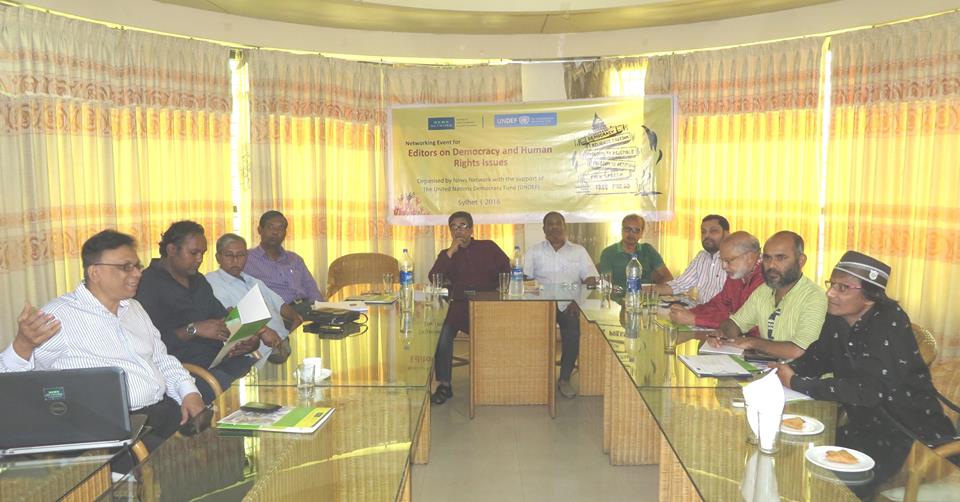
Media has a major role to mobilize public for democratic practices and human rights
On June 2, 2016 News Network met with editors, executive editors and news editors of newspapers in Sylhet to discuss the role of the media houses in promoting democracy and hu man rights through in-depth reports, features and columns. Shahiduzzaman, editor of News Network and Farid Hossain, Dhaka correspondent of Time magazine conducted the session. Sylhet is a north-estern division of Bangladesh.
man rights through in-depth reports, features and columns. Shahiduzzaman, editor of News Network and Farid Hossain, Dhaka correspondent of Time magazine conducted the session. Sylhet is a north-estern division of Bangladesh.
The news leaders (gatekeepers) agreed that the media has a big role to play in mobilizing the public opinion in favour of democratic practices and human rights. However, they pointed out some problems they face in carrying out the task.
They observed that local newspaper owners often focus more on issues that earn them advertisement revenues rather than highlighting the issues that affect their lives.

So, they suggested holding similar dialogue with the owners. Lack of resources, logistic support and travel expenses have also been cited as reasons why media houses can’t send reporters to remote villages to report on violation or upholding of democratic and human rights practices.
They, however, appreciated the media training News Network conducted for reporters on human rights and democracy with the support of the United Nations Democracy Fund

Editor’s Note:
Dear Friends and Colleagues,
eNewsletter is a new effort of News Network , a leading non-profit media support organisation of Bangladesh, to share information and initiatives around the world, as it envisages a nation where citizens are aware of their rights, enjoy freedom of expression, dignity of life, gender equality and free media.
Since its inception in 1994, it has implemented a good number of projects across Bangladesh with assistance from national and international funding organisations. But, we need to move further.
In the last two decades, Bangladesh media have got more pluralised expanding its outreach from cities to remote areas. People are getting more information than any time before thanks to the rapid advancement of technology. But, we still have to go a long way, as freedom of press, freedom of expression, and gender equality in the media are yet to reach the desired level.
News Network seeks greater cooperation and support from the international organisations an
d donors concerned to keep its ongoing drive afloat, particularly in improving the professional capacity of journalists working from remote areas, where 80 percent people live; the safety of journalists, promoting more women in journalism, sensitising journalists on crucial issues to combat violence against women and child/forces marriage, promoting democracy and human rights, dealing with climate changes, water management and alleviating poverty.
You can directly reach me through the following address:
Shahiduzzaman, Editor & CEO, News Network
info@newsnetwork-bd.org

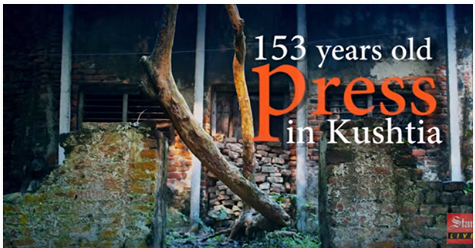
150 years old press that still works
More 150 years ago, the elite Bangalis involved in industrial production of indigo used to treat the farmers and workers inhumanely. During that time, Kangal Harinath Majumder, an employee of a British-owned indigo production factory, witnessed the cruel manner how the workers, who sacrificed their sweat and blood, were being exploited by the zamindars and the British Raj.
Harinath never forgot what he saw, and left the job to start teaching students at his small village in Kushtia. It was then that he decided to wage a war against such atrocities in his own way— by publishing news in his own newspaper.
With the help of a loan and his savings, he founded his own publishing house in Kumarkhali of Kushtia in 1863 and started publishing news against such oppression in his weekly Bangla publication, Gram Barta Prokashita.
This has essentially made Kangal Harinath Majumdar the first Bengali investigative reporter, and Gram Barta Prokashika can be heralded as the first Bangla language newspaper that directly attacked the imperialists and the zamindars.
Renowned author Mir Mosharraf Hossain wrote part of his classic novel Bishadshindhu inside this press building in Kumarkhali. In fact the novel and Lalon’s songs were also first published in Gram Barta Prokashika.
Amazingly, the press Harinath had built still works today! If you go there in Kushtia, you will find the press building in a very shabby condition, but inside, the 150 years old printing press remains intact with the printing blocks and pages printed that date back to the 19th century!
The news publications of the 19th century were printed in hand-driven press machines. The alphabets would be arranged in a frame and then printed on paper. It would take hours for the ink to dry and probably a day to print a small publication.
Three workers were required to print a single page; one person would arrange the alphabets in the correct form in a dais, another would place single pages on the dais and apply pressure on the press machine to print the letters, and the third person would dry the pages after they were ready while someone else would bind them to form a whole publication.
It is difficult to even imagine such an arduous process in our digital age.
According to his descendents who live in the adjacent premise, the press can still print 300 pages a day and this kind of printing machine may not be found elsewhere in the country.
But like the building itself, the press is rotting due to lack of finance. Each time there is rain, the press becomes damp from the leak in the ceiling.
Recently the government allocated a budget of Tk 6 crore to build a museum in Kumarkhali to preserve the press.
But Harinath’s descendents who have been struggling to maintain the press with whatever resources they can are not comfortable with the government’s plan.
The fifth generation of Kangal Harinath, Debashish Majumdar says, “We are happy that government has taken this museum project. But I think the museum should be here in Kangal Harinath’s press building.”
Source: The Daily Star
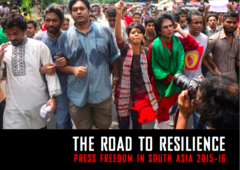
The Road to Resilience: Press Freedom in South Asia 2015-16 report released
The International Federation of Journalists (IFJ) and the South Asia Media Solidarity Network (SAMSN) marked World Press Freedom Day with the launch of The Road to Resilience: Press Freedom in South Asia 2015-16. The 14th annual report outlines the press freedom in South Asia’s media over the past year.
In the period under review (May, 2015 to April, 2016), 31 journalists, bloggers and media workers were killed. India is emerging as one of the most dangerous countries for journalists as is Bangladesh with an ongoing trend of violent attacks against bloggers.
“Tackling South Asia’s poor record on impunity for crimes against journalists will take more than strong words. For those fighting impunity, the price can be high but there have been positive signs with some arrests and convictions,” the IFJ said.
This year’s report features country reports from the region as will as situation reports on trouble spots and emerging issues, including the current deadly climate facing Bangladeshi bloggers, media freedom struggles in Chhattisgarh state in India as well as Kabul and Kunduz in Afghanistan.
The IFJ said that the resilience of South Asia’s media community is a testament to the state of press freedom across the region. But there are clearly major challenges. In the two weeks leading up to the launch of the report there were two more horrendous murders of individuals working to push the boundaries of freedom of expression in Bangladesh – blogger Nazimuddin Samad and editor Zulhaz Mannan. They are among seven journalists and bloggers killed in the past year under a ruthless killing strategy by fundamentalists and extremists.
Building on the 2015 IFJ gender and media research, this year’s report also documents the growing issues for women in the media in South Asia, with a particular spotlight on online harassment and trolling of women journalists. This focus outlines the experience of independent female media workers, harassed, intimidated, threatened and attacked for simply doing their job.
In the battle against impunity, there were several victories. Pakistan had a win against impunity, convicting the killer of journalist Ayub Khattak, while in Sri Lanka convictions were made and a trial began into the forced disappearance of political cartoonist Prageeth Eknaligoda.
The report, supported by UNESCO, UNDEF and the Norwegian Ministry of Foreign Affairs, is a key tool for advocacy on issues such as press freedom, impunity and gender equity in the media.
The IFJ added: “Despite the dangers, the journalists in South Asia are not only focussed on presenting the true story to the public, but also are also working equally hard to ensure people’s right to freedom of expression and press freedom. The journalists are taking their battles to the courts, streets and online space for advocacy and building unity and solidarity for campaigning on common causes.”
The International Federation of Journalists (IFJ)

In 2015 eight journalists had been awarded for best reporting on Democracy and Human Rights issues
News Network with the support of the United Nations Democracy Fund (UNDEF) awarded eight journalists for best reporting on Democracy and Human Rights issues. Journalists, based in remote rural districts of Bangladesh who were trained by the News Network, participated in the competition. The award giving ceremony was held on 29 February at News Network Office in Dhaka.
The winners are: First – Maksud Ali, Staff Reporter of The Daily Probaha, Khulna; Second – Mohammad Ali, Correspondent of the Dainik Deshbarta, Dinajpur; Third – Rashidul Islam, Staff Reporter of The Daily Manabzamin, Khulna. Five journalists jointly secured the fourth position. They are Hedait Hossain, Reporter, Jugantor, Khulna; Golam Rabbani Sourov, Correspondent, Bahumatrik.com, Bogra; Amit Roy, Correspondent of Jugantor, Mymensingh; Shihab Uddin Bipu, Correspondent of NTV, Brahmanbaria; Abdur Razzak Rana, Bureau Chief of Dainik Sangram, Khulna office.
Jury members Farid Hossain, Correspondent, Time Magazine and former Bureau Chief of The Associated Press, Dhaka; Shamsuddin Ahmed, Former Joint Editor, The Daily Observer; and Ziaur Rahman, Special Correspondent, The Financial Express; and News Network Editor and CEO Shahiduzzaman, trainers and programme organisers were present at the function.

